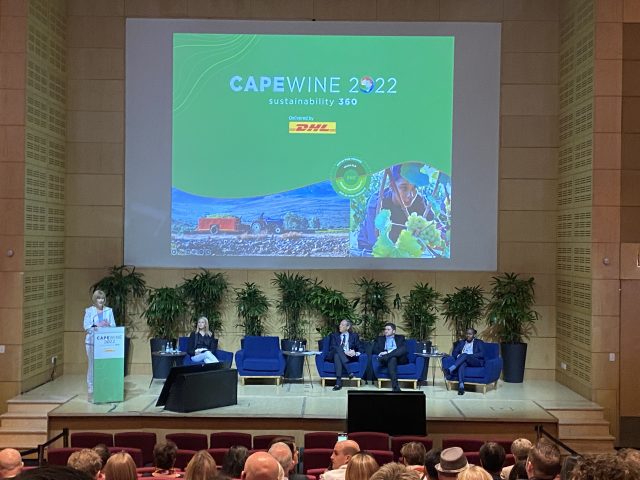This website uses cookies so that we can provide you with the best user experience possible. Cookie information is stored in your browser and performs functions such as recognising you when you return to our website and helping our team to understand which sections of the website you find most interesting and useful.
CapeWine 2022 kicks off with sustainability in mind
Today marks the beginning of CapeWine 2022, South Africa’s annual wine trade fair, with an opening statement from Siobhan Thompson, CEO of Wines of South Africa (WoSA), putting the focus on sustainability.

CapeWine kicks off today after four years of cancellation as a result of the Covid-19 pandemic. In light of the hard times the South African wine trade has faced over the last few years, speakers at today’s opening seminar were focused on the longevity of the South African wine industry.
Siobhan Thompson, who was instrumental in organising the fair, pointed to the Old Vine Project, a non-profit company that certifies the plant dates of vineyards that are 35 years and older, as a key step forward when it comes to both recognition and pricing for South African wines.
South Africa produces the largest proportion of Fairtrade wines in the world, and WoSA has also been working with Fairtrade in order to raise the percentage of ethically made wines.
Also present on the panel of speakers was Minister Thoko Didiza, Minister for Agriculture, Land Reform and Rural Development. Despite the challenges set by the pandemic, export revenues for the country increased 21% by the end of 2021, according to Minister Didiza, back to pre-pandemic levels.
Wine makes up 6% of South African export revenue, and remains the fourth largest agricultural export product, highlighting its vital role when it comes to economic recovery.
The agriculture ministry is currently looking to new wine export markets in order to create “necessary revenue both for the farmers and the country,” the Minister said, with a focus on Saudi Arabia, China, India and Japan.
The South African trade continues to face a multitude of challenges, including consistent power outages or ‘load-shedding’ and labour strikes, which Nedbank Group senior economist Isaac Matshego described as a “permanent handicap”.
Despite labour woes, Antonio Amorim, president and CEO of cork producer Corticeira Amorim, encouraged European investors to see South Africa as “a land of opportunity and potential in the world of wine”.
Amorim noted that the Covid-19 pandemic was particularly hard for the South African wine industry, with shut-downs of on-trade and off-trade wine sales and exports. However, its survival, and the continued direct-to-consumer sale of wine highlighted that “wine is essential to people’s lives”, he said.

